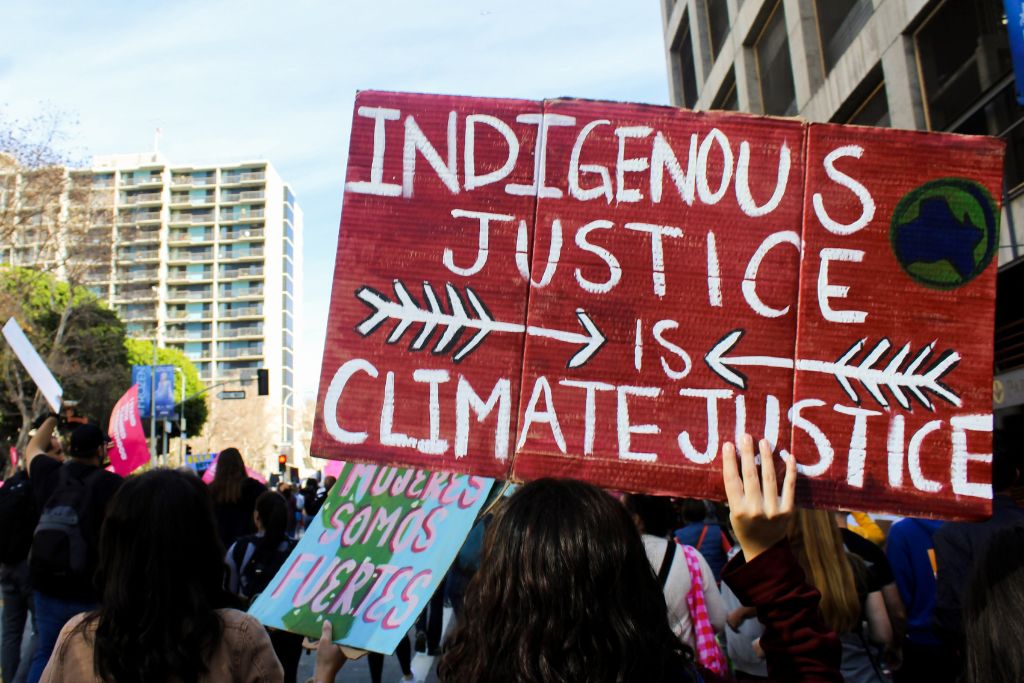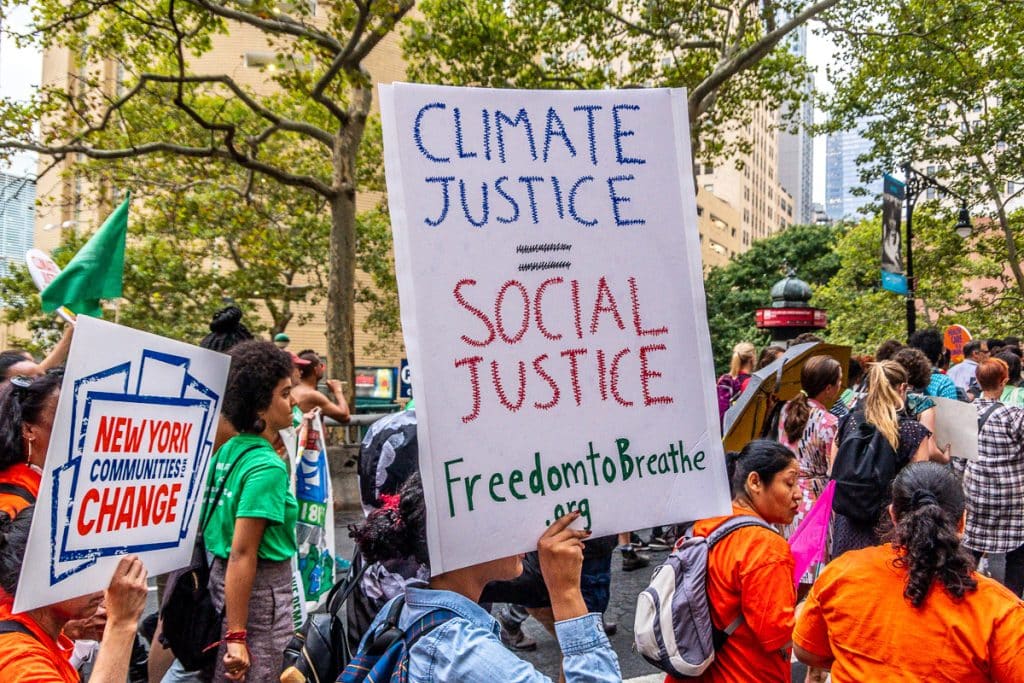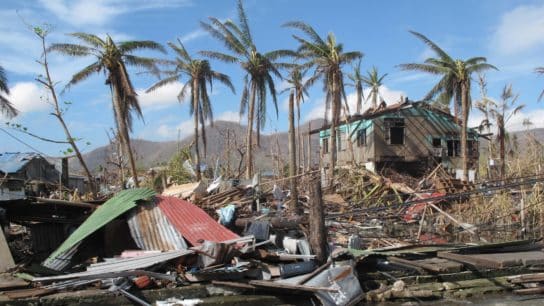Climate change is not only an environmental issue but also a matter of social justice. It intersects with pre-existing inequalities based on gender, class, race, and other dimensions, intensifying and exacerbating these discrepancies.
—
Climate change poses both physical and mental health risks. However, certain groups, particularly those who are socially and economically disadvantaged, face greater vulnerabilities. These disparities arise from structural factors such as ethnicity, race, and gender, and other socioeconomic factors such as exposure to weather hazards, health conditions, income levels, and limited access to resources.
Climate Change and Racial Inequality
A 2019 study by the University of Minnesota found that white individuals were exposed to approximately 17% less pollution than they generated. In contrast, Hispanic individuals experienced 63% more pollution than they produced, 56% for Black individuals. Location plays a significant role in these disparities: Black and Hispanic people are more prone to living in areas where they face a higher risk of exposure to poor air quality and water contamination from polluting industries, as highlighted by the United Nations.
In addition to facing significant impacts from air pollution, minority ethnic groups are also notably affected by extreme temperatures. In 2021, US Environmental Protection Agency (EPA) examined six impacts of climate change, including considering air quality and health, extreme temperature and health, extreme temperature and labour, coastal flooding and traffic, coastal flooding and property, and inland flooding and property. They found that black and African American individuals are expected to experience the greatest effects of climate change than any other demographic group in the country. For instance, with a 2C (3.6F) increase in global warming, Black and African American individuals are 40% more likely than non-Black and non-African American individuals to reside in regions where the expected rise in premature deaths caused by extreme temperatures is the highest. They are also 34% more likely to live in areas where the projected increase in childhood asthma cases is the most significant.

The report also concluded that Hispanics and Latinos have high participation in weather-exposed industries, including construction and agriculture, which makes them especially vulnerable to the effects of extreme temperatures. To be specific, with 2C (3.6F) of global warming, Hispanic and Latino individuals were found to be 43% more likely than non-Hispanic and non-Latino individuals to live in areas with the highest projected labour hour reductions due to extreme temperatures driven by climate change. These findings illustrate a profound interconnection between climate change and racism.
Extending beyond personal interactions, racism also operates in institutional realms where individuals of color frequently encounter disparities in service and care. Institutional racism that is deeply ingrained in our society places marginalized communities at heightened risk when confronting the impacts of climate change, leaving them disproportionately vulnerable and often ill-equipped with useful resources to address these challenges. This goes to show that climate change can never be solely an environmental issue but always intertwines with systemic racial injustices.
Climate Change and Gender Inequality
Just as climate change affects people on different levels based on race, climate change is never gender-neutral. Under conventional gender forms, women tend to be overly burdened with household work and caring for children, which significantly increases the likelihood that they are confined to their homes. This dynamic was starkly demonstrated during the 2004 Indian Ocean tsunami, where 70% of the victims were women. Many women and children were trapped indoors, whereas most men were outside at the time.

Apart from reduced chances of survival, climate change is also more likely to make it difficult for women to sustain their livelihoods. In Asia and the Pacific, where women widely engage in agriculture and play a central role in rural economies, intensifying climate-related disasters, such as shifting weather patterns, droughts, and floods are increasingly disrupting rural areas, leading to crop failures and, in turn, jeopardizing the livelihoods of people relying on agriculture.
You might also like: When Disaster Strikes: 4 Ways the Climate Crisis Impacts LGBTQI+ People
Climate Change and Socioeconomic Inequality
According to Oxfam Hong Kong’s 2021 study entitled “Impacts of extreme weather on subdivided flat residents,” nearly half of the city’s subdivided flats are hotter indoors than on the streets, with temperature differences reaching up to 5.8C (42.4F), and the hottest subdivided flats reaching a temperature of 35.1C (95.2F). In these sweltering conditions, almost 70% of respondents reported feeling physically worse, struggling to focus on tasks or studying, and experiencing increased mental stress. Additionally, due to limited space, residents living in subdivided flats find it challenging to install air conditioning units, leading to many impoverished Hong Kong residents enduring uncomfortable and poorly ventilated conditions during the hot months.
Climate change also has a significant impact on low-income individuals working in grassroots positions. A 2022 Oxfam Hong Kong’s study on working conditions in waste collection centers in Hong Kong revealed that temperatures inside these facilities averaged 32.2C (90.0F), surpassing the July average by two degrees. Issues such as poor ventilation, heat, humidity, pests, foul odors, and a lack of rest areas are prevalent in both existing and renovated waste collection centers. Under these circumstances, over 60% of cleaners expressed experiencing discomfort while on duty, with more than 70% indicating that they must stay in cooler and shaded areas along the streets for breaks and meals. Upon returning home from work, these workers may also have to endure extreme hot weather.

According to interviews conducted by Hong Kong-based local group Concern for Grassroots’ Livelihood Alliance in August 2024, 90% of the street cleaners reported experiencing fatigue, thirst, headaches, dizziness, increases in body temperature, and nausea while working, despite their employers providing portable fans. “I have to drink seven bottles of drinks a day, including water, homemade herbal tea, energy drinks, and more,” Pattie, a 55-year-old cleaner, told Hong Kong Free Press in July. “Sometimes, when it’s too hot, even the taste of water makes me feel nauseous,” Pattie added.
Why Is Climate Change a Matter of Justice?
The impacts of climate change do not affect everyone equally but rather intersect with and exacerbate pre-existing inequities rooted in factors such as socioeconomic status, race, gender, and geographic location. Vulnerable and marginalized communities, including racial and ethnic minorities, the economically disadvantaged, women, and other minorities, bear a disproportionate burden. Due to structural social inequalities, they often lack the resources and resilience to adapt to the changing climate.
The status quo underscores the critical need to understand climate change through the framework of inequality and address the climate crisis through the lens of social justice. Only by recognizing and remedying these disparities can we achieve climate justice and build a more equitable, resilient, and inclusive society in the face of the immense climate challenges.
How can I contribute to a more sustainable planet?
- 🗳️ Vote for Climate Action: Exercise your democratic rights by supporting candidates and policies that prioritize climate change mitigation and environmental protection. Stay informed with Earth.Org’s election coverage.
- 👣 Reduce Your Carbon Footprint: Make conscious choices to reduce your carbon footprint. Opt for renewable energy sources, conserve energy at home, use public transportation or carpool, and embrace sustainable practices like recycling and composting.
- 💰 Support Environmental Organizations: Join forces with organizations like Earth.Org and its NGO partners, dedicated to educating the public on environmental issues and solutions, supporting conservation efforts, holding those responsible accountable, and advocating for effective environmental solutions. Your support can amplify their efforts and drive positive change.
- 🌱 Embrace Sustainable Habits: Make sustainable choices in your everyday life. Reduce single-use plastics, choose eco-friendly products, prioritize a plant-based diet and reduce meat consumption, and opt for sustainable fashion and transportation. Small changes can have a big impact.
- 💬 Be Vocal, Engage and Educate Others: Spread awareness about the climate crisis and the importance of environmental stewardship. Engage in conversations, share information, and inspire others to take action. Together, we can create a global movement for a sustainable future.
- 🪧 Stand with Climate Activists: Show your support for activists on the frontlines of climate action. Attend peaceful protests, rallies, and marches, or join online campaigns to raise awareness and demand policy changes. By amplifying their voices, you contribute to building a stronger movement for climate justice and a sustainable future.
For more actionable steps, visit our ‘What Can I do?‘ page.
This story is funded by readers like you
Our non-profit newsroom provides climate coverage free of charge and advertising. Your one-off or monthly donations play a crucial role in supporting our operations, expanding our reach, and maintaining our editorial independence.
About EO | Mission Statement | Impact & Reach | Write for us














